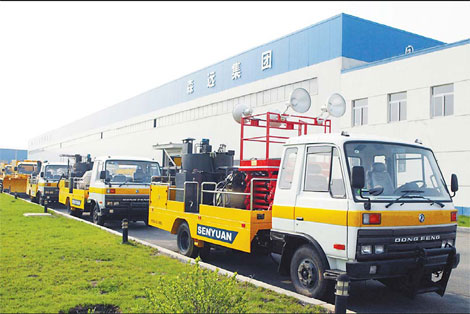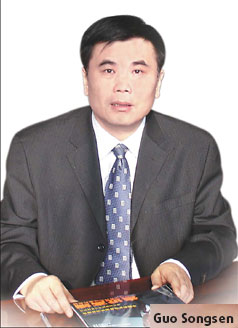


Guo Songsen, chairman of Anshan Senyuan Road and Bridge Co Ltd in Liaoning province, is a typical northeastern man with a powerful frame, chubby face and deep eyes, who speaks with a deep, grave voice.
Unlike business leaders people have seen before, Guo looks like a strict school headmaster or a poker-faced government officer with deep wrinkles between very dark eyebrows.
Indeed, he was. Guo used to be an official of the Organization Department at the Anshan Committee of the Communist Party of China (CPC), a position with potential for a promising future.
It is a study in contrast to see Guo in his spacious, grimy industrial factory buildings still dressed like a government official in a pressed white shirt, expensive tie and black and blue striped jacket.
Guo's life has changed tremendously since he left a secure government career to become a leading force in China's road maintenance machine manufacturing sector.
He's also a courteous man, frequently bowing when talking with people, not only to his business partners, but also his staff.
His company, Senyuan, is a private enterprise in Anshan city that produces road repair machines, road maintenance machines, asphalt makers and snowplows.
Senyuan independently developed China's first asphalt recycling and road repair machine in 2000, and also world's first discharged asphalt and mixed material recycling and road repair machine in 2003.
Its products are in line with China's energy saving and emissions reduction policy, and have been sold to more than 20 provinces and cities in the nation. With more than 520 staff and 230 million yuan in fixed assets, its sales revenue reached 495 million yuan in 2007, up 41 percent year on year.
In contrast to his former life as a government bureaucrat, now Guo is occupied with phone calls, meetings, negotiations, media interviews and many other responsibilities he never touched before.
"As a leader of such a promising enterprise, many people praise me for my accuracy, keenness of judgment and insight, but actually it was not like that, " says Guo. "The era pushed, encouraged me and made me successful. "
Times make heroes
In the mid-1980s, a few adventurous civil servants tried to spread their career wings by working at some State-owned enterprises as the country was beginning to open up.
In the 1990s, their time seemed nearer after then-leader Deng Xiaoping made his famous southern tour and inaugurated the market reform process.
The government followed suit by initiating supportive policies that allowed officials and civil servants to go into business on their own in a movement that the Chinese dubbed "going to sea".
Government departments at all levels were also being reformed, reshuffled, reduced and by 1999 city, headcounts in county and village governments throughout China were reduced by about 2.8 million people. Along with the enforcement of Provisional Regulations of the People's Republic of China on Private Enterprises in 2000, civil servants becoming private entrepreneurs had become a trend in China.
Guo was one of those pioneers.
"I feel lucky that I overcame that tough period," he says.
Guo never worked as a factory worker or an enterprise manager after graduating from university. His official career looked bright as an officer at Anshan Municipal Bureau of Personnel to a position as an official of the Organization Department of CPC Anshan Committee.
He recalls that at the time people said China doesn't need more provincial governors and mayors, but instead it need good entrepreneurs.
This opinion inspired Guo and despite the reservations of his family in 1992 at age 29, he left his seven-year civil service position and struck out on his own.
He did have a fallback plan, however.
"If the business failed, we were allowed to go back working at our previous positions," Guo says.
"But as for me, I wanted to take risks and take the hard way."
Tough start

Guo persuaded his family gradually and started his business in the building materials trade and interior decoration then went into a machine parts manufacturing business. It was named Senyuan in 1998.
A "walk-on" is a utility role in Chinese traditional opera. And Guo says initially his company played such a role, painstaking but unnoticed, in Liaoning's huge and advanced machine manufacturing industry.
For the first two years, the company was making supporting parts and components for other enterprises.
"I was depressed when the machine parts made by Senyuan were used for products of other companies, and Senyuan could not even put its name on them, " he says.
Guo decided to reform and push Senyuan to become an independent enterprise with own core business and unique products.
Senyuan's first project was snowplows, not an easy task for a business with less than 20 employees.
Guo sent some of his staff, to study at the Provincial Highway Administration to determine the needs and demands of highway operations by day, while at night they were disassembling several foreign snowplows that they had purchased in order to learn the designs.
After a year, Senyuan produced its first snowplow and sold for it over 300,000 yuan. Encouraged by their success they made several other kinds of products, such as lawnmowers, and Senyuan gradually made a name for itself by making a niche for itself in the road maintenance business. At the time there were about 1.3 million Km of paved roads in China, but most of the business was going into construction.
"According to my experience in the machine industry, innovation is the lifeline for an enterprise," Guo says.
Guo and his partners and staff pooled about one million yuan plus some loans, and started their research and development of a black top repair machine.
"During that time, my colleagues and I moved to live in the factory. We slept there when we were tired and then got up to continue working," he says
The hard work paid off in 2002 when Senyuan produced a blacktop repair machine that was the country's first developed with independent intellectual property rights.
Now, Senyuan has become a technology innovation demonstration enterprise in Liaoning.
From official to entrepreneur
Guo was not the only government official who "went to sea" but also one of the few who didn't drown. Of others in his old department who left to seek their fortunes as entrepreneurs, more than 90 percent returned to their old jobs within five years.
The key to success outside of the government is "to accept your new identity and its pitfalls as well as to rely on your previous experience as an official", Gou says.
"As a government official, people always respect and flatter you. But as entrepreneurs in China, especially those with small and medium-sized enterprises, there is a lot of discrimination and sometimes people create difficulties for you," he says.
What makes Guo easy with the transition was his childhood experience as the son of a former landlord family in a rural area of Heilongjiang province.
At the time when people were judged by their parentage, Guo was isolated by his classmates due to his family's "feudal" origins, and he says even teachers didn't help him in his studies. He always went home immediately after class, because he was scared of staying at school.
"It did help me to be less vulnerable to unfair treatment and discrimination when I'm doing business," Guo says.
Government officials do have advantages when they are running an enterprise, Guo says. First they come from China's elite group with a good educational background and well trained at organizing and mobilizing their human resources. Most are also adept at predicting and catching the direction of governmental policies and making appropriate decisions and strategies, he says.
Senyuan has been concentrating on innovation and manufacturing environmentally friendly road maintenance machinery because the government is pushing energy efficiency and environmental protection for all industries across the country.
"A business career is full of challenges and conquest, but being an official is just repeating myself," he says.
"I enjoy my life as an entrepreneur since everything I have done rewards me with a lot honor and satisfaction. It is what I never experienced as a government official," Guo says, his face wreathed with smiles.
Through his constant efforts of running his enterprise, Guo wants to argue that government officials are not only good at writing reports and having meetings, they also can do business and fight in commercial field.
On the bookshelf in his office, the series of Sun Tzu's Art of War is displayed. Guo says he reads them during his leisure time.
Doing business well is like winning a war, and the key to success in both is creating and using the right strategy, he says.
(China Daily 08/25/2008 page12)













